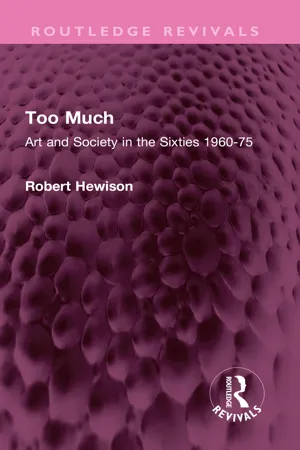
- 374 pages
- English
- ePUB (mobile friendly)
- Available on iOS & Android
About this book
First published in 1986, Too Much records the tumultuous period between 1960 and 1975 when, more than at any other time in history, the arts were a battleground for the conflicting forces of social change. With the new affluence of the Sixties the cultural conformism of the previous decade was rejected in favour of new forms of expression. Pop Art, pop music, fringe theatre and performance poetry helped to create the semi-mythological image of 'Swinging London.' The liberation ethic was feted as it masked the insecurities of a society in decline but, as a real political challenge to the status quo, it also led to conflict. The confrontation between official culture and the underground came in 1968, a year with its own mythical resonance. This book will be of interest to students of art, media studies and cultural studies.
Frequently asked questions
- Essential is ideal for learners and professionals who enjoy exploring a wide range of subjects. Access the Essential Library with 800,000+ trusted titles and best-sellers across business, personal growth, and the humanities. Includes unlimited reading time and Standard Read Aloud voice.
- Complete: Perfect for advanced learners and researchers needing full, unrestricted access. Unlock 1.4M+ books across hundreds of subjects, including academic and specialized titles. The Complete Plan also includes advanced features like Premium Read Aloud and Research Assistant.
Please note we cannot support devices running on iOS 13 and Android 7 or earlier. Learn more about using the app.
Information
Table of contents
- Cover
- Title Page
- Copyright Page
- Original Title Page
- Original Copyright Page
- Dedication Page
- Table of Contents
- List of illustrations
- Acknowledgements
- Foreword
- Chapter 1 Understanding Media
- Chapter 2 The Young Meteors
- Chapter 3 Bomb Culture
- Chapter 4 The Dialectics of Liberation
- Chapter 5 Goodbye Baby and Amen
- Chapter 6 The Party
- Chapter 7 The Arts in Hard Times
- Chapter 8 The Poverty of Theory
- Chapter 9 Afterwords
- Notes on Sources
- Index